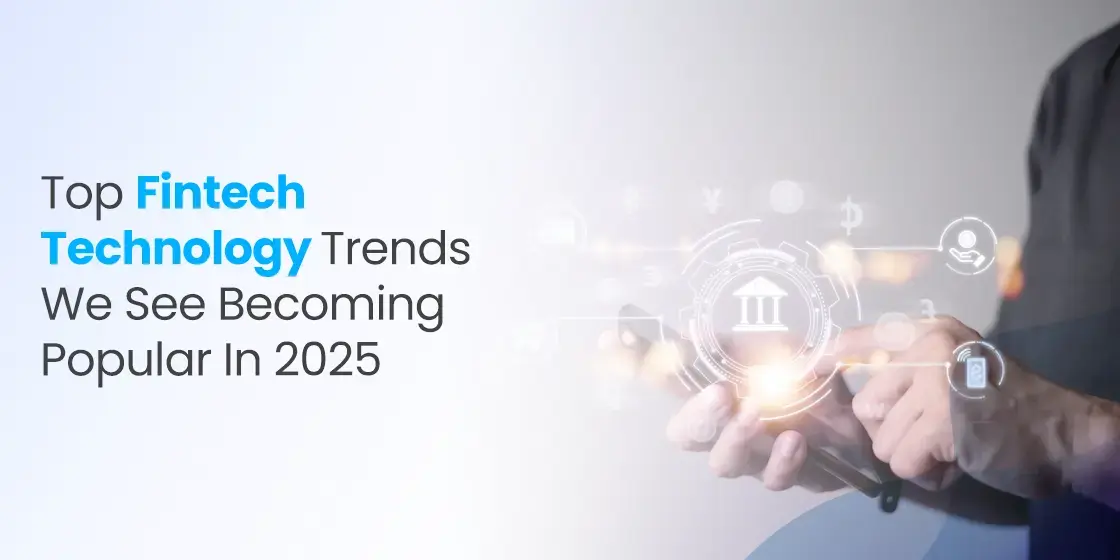Table of Content
Discover How the Latest Fintech Technology Trends Change the Way Businesses Operate
The fintech industry is experiencing explosive growth, fueled by rapid technological advancements, changing consumer expectations, and a growing demand for innovative financial solutions. This dynamic landscape is constantly evolving, with new trends emerging and reshaping the financial services landscape.
In 2025, we can expect to see several key fintech trends gaining significant traction. These trends are driven by factors such as the increasing adoption of mobile devices across the world, the rise of artificial intelligence (AI), and the growing demand for personalized and convenient financial services. Moreover, the addition of the younger generations, especially the Gen Z to the workforce is driving this change quite quickly.
In this article, we will explore some of the top fintech technology trends that are poised to shape the industry in 2025 and beyond. We will dive into their implications for consumers, businesses, and the overall financial ecosystem, and discover why custom software development services are vying to enter this field of lasting biztech impact.
Understanding the Fintech Industry and Its Implications in These Years

Fintech, short for financial technology, encompasses a broad range of technological innovations that are transforming the financial services industry. These innovations include mobile banking, peer-to-peer lending, cryptocurrency, blockchain technology, and many more. Fintech companies are disrupting traditional financial institutions by offering innovative solutions that are often more convenient, affordable, and accessible to consumers.
The rise of fintech has had a profound impact on the financial landscape. It has increased competition, leading to greater transparency and lower fees for consumers. Fintech companies are also empowering individuals and businesses with greater control over their finances, providing them with access to a wider range of financial products and services in the form of AI SaaS products.
Furthermore, fintech is driving financial inclusion by providing access to financial services for underserved populations. This includes individuals who are unbanked or underbanked, as well as those living in remote areas with limited access to traditional banking services.
Applications of Fintech in Business These Days

Fintech technologies are being widely adopted by businesses across various sectors. Although fintech may refer to financial technology, its applications lead to more than just financial advancements in business. The ability to incorporate technology into finance opens up new avenues for businesses to improve and streamline their functions. Some key applications of fintech in business include:
- Payments: Fintech companies are revolutionizing payment processing through innovative solutions such as mobile payments, digital wallets, and blockchain-based payment systems.
- Lending: Fintech companies are offering alternative lending solutions, such as peer-to-peer lending and marketplace lending, to individuals and businesses.
- Wealth Management: Fintech companies are providing automated investment services, robo-advisors, and personalized wealth management solutions.
- Insurance: Fintech companies are developing innovative insurance products, such as on-demand insurance and microinsurance, to cater to the evolving needs of consumers.
- Supply Chain Finance: Fintech solutions are improving supply chain efficiency by facilitating faster payments, reducing costs with AI business process automation, and improving cash flow.
Fuel innovation by leveraging bespoke software solutions. Get in touch with our team of experts to build cutting-edge software products.
Get a QuoteEight of the Top Fintech Technology Trends That Are On the Rise in 2025
Now that we understand how the addition of fintech can help businesses, you might be wondering about the possible avenues of fintech integration for your business. Listed below are the top fintech technology trends that we see becoming popular in 2025 and beyond, as their versatility helps businesses improve and enhance their workflows.
Let’s take a closer look at these fintech trends.
Trends #1: A Rising Popularity of Embedded Finance

Embedded finance refers to the seamless integration of financial services into non-financial products and services. This involves embedding financial functionalities, such as payments, lending, and insurance, within existing platforms and applications.
For example, e-commerce platforms can offer embedded financing options to customers at the point of sale, allowing them to buy now and pay later. Ride-hailing apps can offer insurance options to their drivers. This trend will lead to a more integrated and personalized financial experience for consumers.
Trends #2: A Stronger Focus on Accurate and Efficient Business with Regtech Solutions
Regtech, or regulatory technology, refers to the use of technology to help financial institutions comply with regulatory requirements. As regulations become more complex, Regtech solutions will become increasingly important for financial institutions to ensure compliance and mitigate risks.
Regtech solutions can automate compliance checks, identify and manage risks, and improve operational efficiency. This will not only help financial institutions avoid costly fines but also enhance customer trust and confidence.
Trends #3: Greater Interest in Reducing Redundancy with Robotic Process Automation

Robotic Process Automation (RPA) involves using software robots to automate repetitive and rule-based tasks, such as data entry, account reconciliation, and customer service.
RPA can significantly improve efficiency and reduce operational costs for financial institutions. By automating mundane tasks, employees can focus on more strategic and value-added activities, such as customer relationship management and innovation.
Trends #4: A Growing Involvement in Environmental Sustainability by Fintech Companies
Environmental, Social, and Governance (ESG) considerations are becoming increasingly important for businesses and investors.
Fintech companies are playing a crucial role in promoting sustainable finance by developing and investing in green technologies, supporting sustainable businesses, and promoting responsible investment practices.
Trends #5: The Fact That Buy Now, Pay Later Fintech Model is Here is Stay

Buy Now, Pay Later (BNPL) services have gained significant popularity in recent years, allowing consumers to make purchases and pay for them in installments. This trend is expected to continue, with BNPL services becoming more integrated into the e-commerce ecosystem.
However, it is crucial to ensure responsible lending practices and protect consumers from excessive debt.
Trends #6: The Use of AI to Revolutionize Financial Technology Sector
AI is transforming the fintech landscape by enabling personalized experiences, improving risk assessment, and automating complex tasks. AI-powered chatbots, for example, can provide personalized customer support and answer customer queries 24/7.
AI algorithms can also be used to detect fraud, assess credit risk, and personalize investment portfolios.
Trends #7: Biometric Security Adoption All-Time High Due to Cybersecurity Issues

With the increasing threat of cyberattacks, biometric security measures are becoming increasingly important in the fintech sector. Biometric authentication methods, such as fingerprint recognition, facial recognition, and voice recognition, offer a more secure and convenient way to authenticate users and prevent fraud.
Trends #8: Younger Consumers Preferring Neobanks to Traditional Organizations
Younger consumers are increasingly embracing digital-first banking experiences and are more likely to choose neobanks and fintech companies over traditional banks. These consumers value convenience, personalization, and access to innovative financial products and services, especially since these companies focus on feature-driven development over block app development.
FAQs
| What is the latest trend in fintech? The most popular recent trend seen in the fintech industry is that of open banking, which makes various banking and finance options more accessible to the masses by cutting out redundancies. |
| What are the key technologies driving the modern fintech landscape? The technologies that drive modern fintech applications include: Artificial intelligence Blockchain Internet-of-Things Encryption and Security |
| What is the next big change that fintech is expected to bring? Fintech is fast approaching its goal of decentralizing finance, making it more accessible to the masses compared to traditional banking. |
Conclusion
The fintech industry is constantly evolving, with new technologies and trends emerging rapidly. By embracing the top fintech technology trends and leveraging the power of innovation, fintech companies can continue to transform the financial landscape and provide more accessible, affordable, and personalized financial services to consumers and businesses worldwide.
Empower your digital initiatives with BariTechSol, a premier custom software development company. Our skilled team tailors cutting-edge solutions to your unique needs. Elevate your tech experience and stay ahead in the digital realm. Partner with BaritechSol and code the success of your next big idea.


